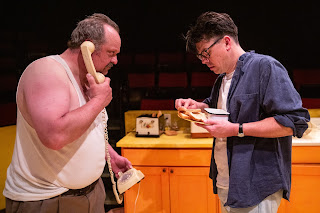True West tells the story of two estranged brothers who meet up later in life. Austin (Joe Swanson) is the younger brother and the responsible, mature, educated one who has a job, wife, and kids. His mother has asked him to house-sit for her in L.A. while she's on vacation. He's a screenwriter so he's using the time to do some research and writing, and as well as meet with an L.A. producer. His older brother Lee (David Tufford) shows up and ruins his plans. Lee is a drifter and a grifter, never staying in one place too long, making money however he can, legal or not. The two brothers have reacted to their father's alcoholism and abandonment in opposite ways - one by being an overachiever and hoping to win his love, the other by becoming more like him. But eventually, they end up at the same place.*
Austin is writing a screenplay on an old typewriter and is about to sell it to his producer Saul (Kjer Whiting). But instead, Lee runs into Saul, and charms and cons him into buying an idea of his. Saul drops Austin's movie for Lee's silly story about two idiots chasing each other across Texas. Austin is furious and frustrated - "everything is riding on this" - which makes you wonder what else is going on in his life that makes him so desperate to sell this screenplay. The brothers fight and argue as they work on the new screenplay based on Lee's story. A celebratory champagne toast turns to the harder stuff, and the kitchen becomes a mess of empty beer cans and littered dishes and silverware (and actual toast). A drunken Austin begs his older brother to let him join him on the road, living in the desert. Lee agrees, but their plan is quashed when their mother (Kathleen Winters) comes home unexpectedly. This feels like just a snippet of this family's life that makes you curious about what happened before and what will happen next.*
 |
| who wants toast? (David Tufford and Joe Swanson, photo courtesy of TRP) |
The brothers write on a little patio covering about a third of the stage, separated from the kitchen by half-walls that differentiate the space but allow flow between them. The kitchen looks real and lived in, with appliances and counters running around the outside, allowing plenty of space in the middle for pacing and fighting. Things take a turn midway through the second act, and it gets so messy that the audience is warned at the curtain call to watch their step as they make their way across the stage to exit the theater. It's fun to watch things get carelessly thrown around the stage, contributing to the chaotic feel of the story. Crickets and coyotes are mentioned in the script, and we hear them clearly, along with other great sound cues. Even the lighting adds to the story, changing with the time of day or the tone of the action. The play premiered in 1980, which is hinted at more in the old tech the characters use than the clothing they wear, except for the slick producer's late '70s showy clothes. (Set design by Michael Haas, prop design by Terri Ristow, sound design by Anita Kelling, lighting design by Shannon Elliott, costume design by Colleen O'Dell.)
I don't know why I love Sam Shepard so much. There's just something so satisfying about watching these uniquely dysfunctional families and their brutal stories, with just enough humor to make it palatable but not make a joke out of it. This is a really great production by TRP, and it's well-suited to their unique in-the-round space. Continuing for two more weekends only, so don't wait too long if you need a good Sam Shepard fix.
*Plot summary borrowed from my review of Torch Theater's 2011 production, to my knowledge the last time this play was done in #TCTheater.

